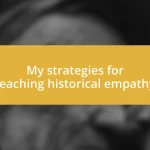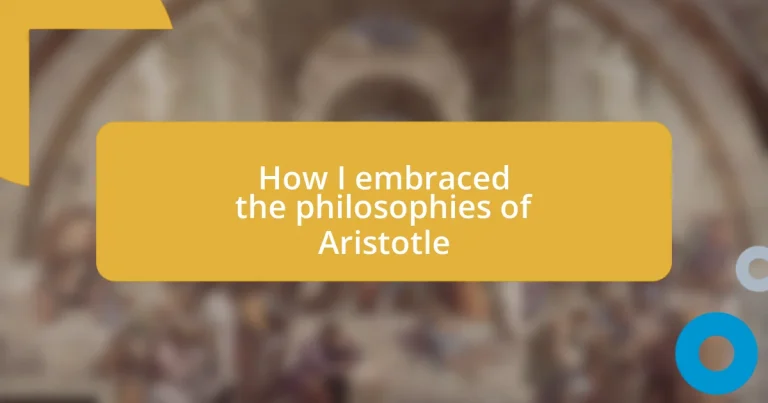Key takeaways:
- Aristotle’s concept of the “Golden Mean” emphasizes the importance of balance and moderation in achieving a virtuous life.
- Active engagement in learning and the evaluation of friendships based on virtue can significantly enhance personal fulfillment and relationships.
- Self-reflection is crucial for personal growth, enabling deeper understanding of oneself and guiding meaningful life changes.

Introduction to Aristotle’s philosophies
Aristotle’s philosophies are a treasure trove of wisdom that continue to resonate with many of us today. His approach to understanding the world is not just theoretical; it’s deeply practical, urging us to seek knowledge and virtue in our daily lives. Have you ever found yourself pondering the nature of happiness and how to achieve it? For Aristotle, happiness is not merely a fleeting emotion but rather a state of being that comes from living a virtuous life.
One of my favorite aspects of Aristotle’s thought is his concept of the “Golden Mean.” This idea encourages us to find balance in our actions and emotions, steering clear of extremes. Reflecting on my own life, I remember a time when I pushed myself too hard at work, ignoring the need for personal time. It was only after embracing moderation that I truly began to feel grounded and fulfilled.
Aristotle’s exploration of ethics, politics, and metaphysics invites us to engage deeply with our values and beliefs. His method promotes critical thinking—a skill I cherish today—by challenging assumptions and encouraging open dialogue. Isn’t it fascinating how his teachings still prompt us to examine our lives and our society? Engaging with Aristotle’s philosophies allows us to navigate our own journeys with mindfulness and intention.
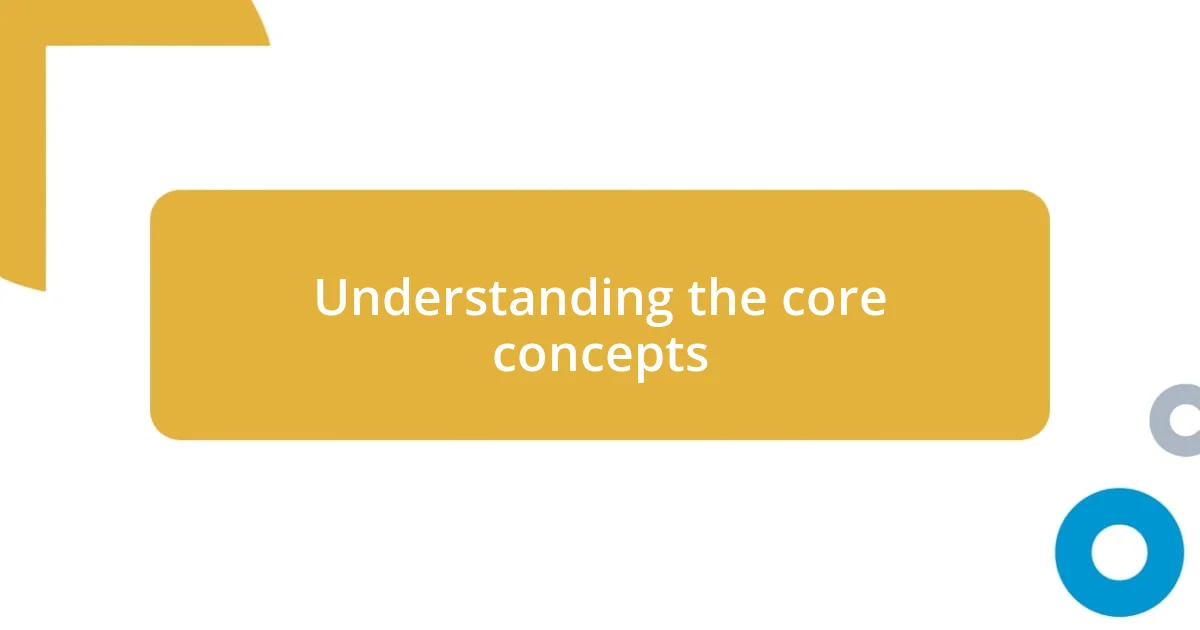
Understanding the core concepts
Aristotle believed that acquiring knowledge requires more than just passive learning—it’s about actively engaging with the world around us. This idea resonates with my journey, as I often find that true understanding emerges through experience and reflection. I’ve had many moments where stepping outside my comfort zone led to insights I couldn’t have grasped from textbooks alone.
His notion of virtue ethics emphasizes the importance of character and moral integrity. Reflecting on my personal growth, it’s clear that striving to embody virtues like honesty and courage has shaped my relationships and decisions significantly. I’ve found that treating others with respect and kindness not only fosters deeper connections but also elevates my sense of self-worth.
Moreover, Aristotle’s thoughts on friendship are particularly impactful. He categorizes friendships into three types—utility, pleasure, and virtue—which made me reconsider my relationships. Evaluating my connections led to a revelation: nurturing relationships based on virtue brings more joy and fulfillment than any superficial association. This deep understanding has enriched my life profoundly, proving that true companionship enhances our pursuit of happiness.
| Core Concept | Definition |
|---|---|
| Golden Mean | The balance between two extremes to achieve virtue. |
| Virtue Ethics | Focus on character and moral integrity as the basis for ethical behavior. |
| Types of Friendships | Friendships based on utility, pleasure, and virtue. |
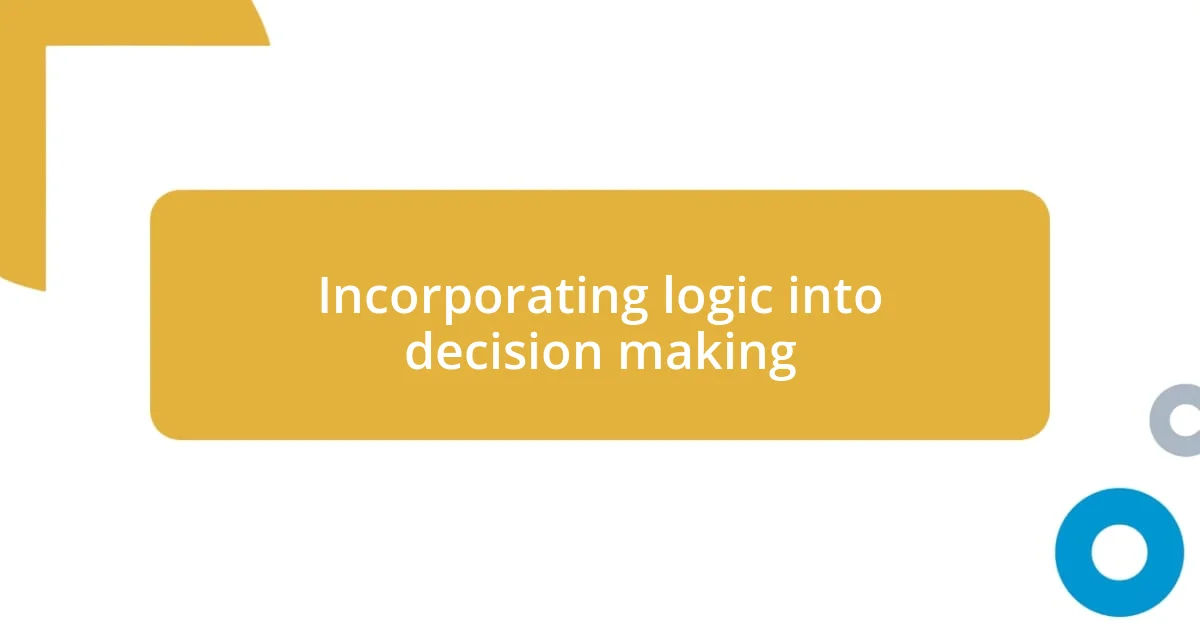
Incorporating logic into decision making
Incorporating logic into decision making has transformed how I approach challenges in my life. I often reflect on Aristotle’s belief that a structured approach leads to clearer outcomes. For me, this means breaking down problems into smaller, manageable parts. When faced with large tasks, I create a logical list of priorities that helps me organize my thoughts. This practice has alleviated much of the overwhelming pressure I once felt.
- Define the problem clearly.
- Gather relevant information.
- Analyze the options logically.
- Weigh pros and cons.
- Make a decision and follow through.
The beauty of logic in decision-making is its ability to remove emotional turbulence from the equation. I recall a situation where my emotions almost clouded my judgment during a career choice. By applying a logical framework, I was able to step back, evaluate my options based on facts, and ultimately pursue a path that aligned with my long-term goals. This clarity not only eased my anxiety but also empowered me to make choices that resonate with my values.
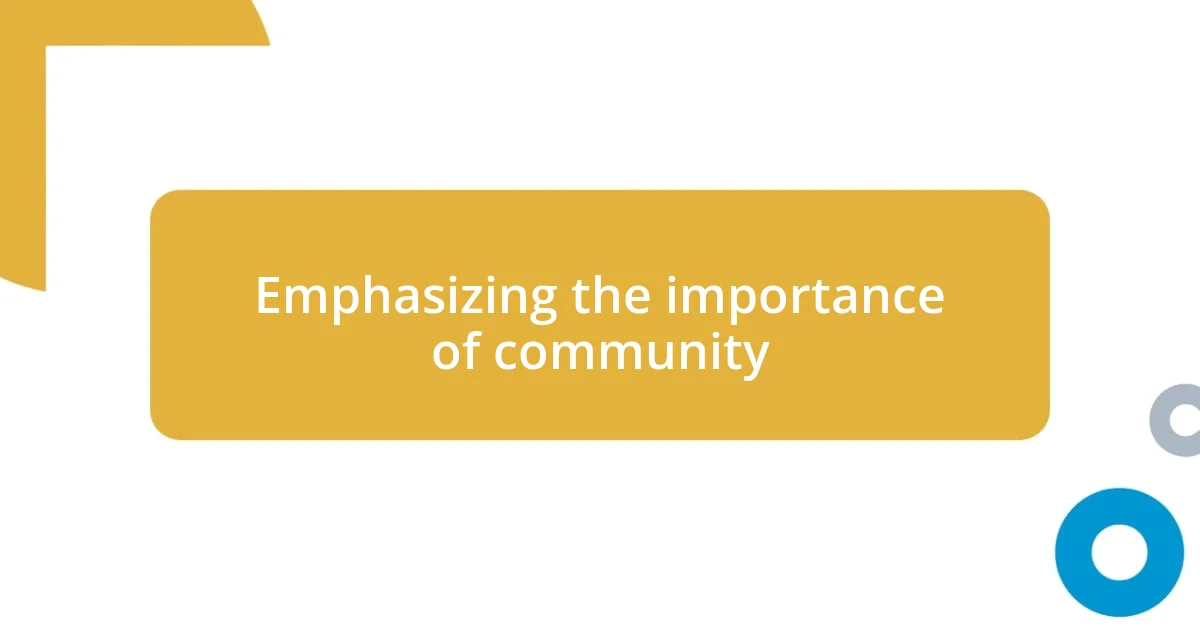
Emphasizing the importance of community
Embracing Aristotle’s views on community has reshaped how I perceive my role within it. I’ve come to understand that our connections with others lay the foundation for a fulfilling life. In a world where it’s easy to feel isolated, I often ask myself: how can I contribute to the well-being of those around me? The answer lies in recognizing that the support we give and receive amplifies our happiness and resilience.
I vividly recall a time when I volunteered at a local shelter. It was a simple act, yet it brought me profound joy and deepened my sense of belonging. Sharing moments, stories, and laughter with people from various walks of life reminded me that community is not just about geographical proximity; it’s about the bonds we cultivate. Each shared experience strengthened my belief that we thrive best in a collective environment, where showing up for one another can transform lives.
Moreover, Aristotle’s emphasis on the communal aspect of happiness spoke volumes to me. He argued that true fulfillment arises not just from personal achievements but from participating in the collective good. I often find myself pondering how my actions impact the wider community. This reflection encourages me to engage more deeply with others, whether through meaningful conversations or collaborative initiatives. I’ve learned that fostering this community spirit enriches not only my life but also the lives of those around me.
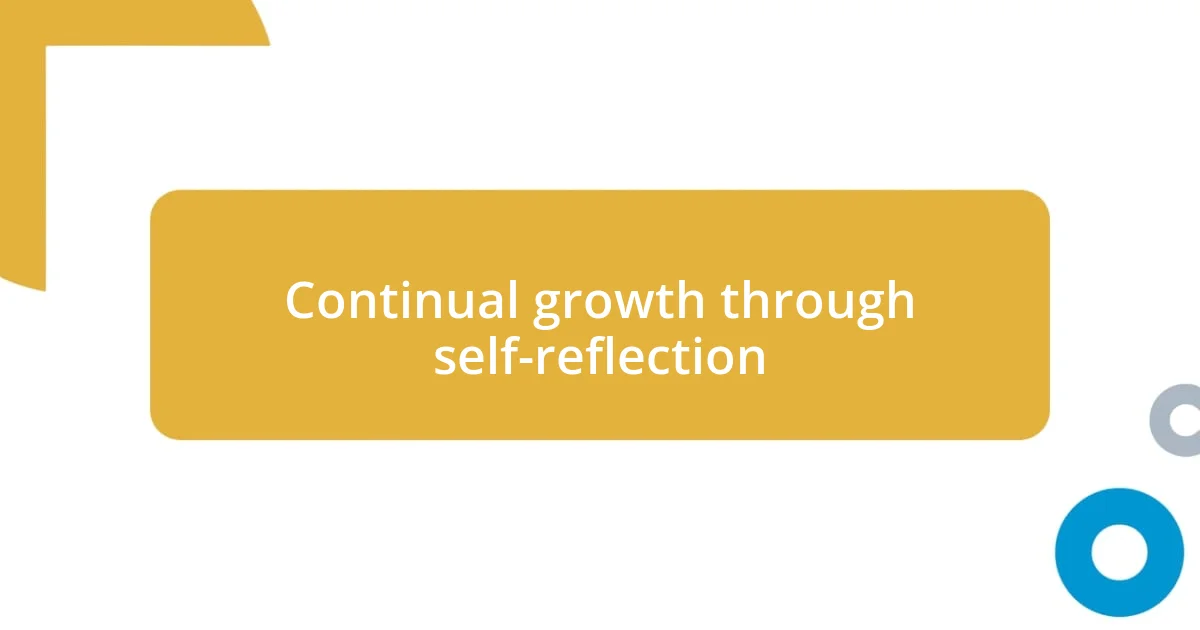
Continual growth through self-reflection
Self-reflection has been a powerful tool for my continual growth, echoing Aristotle’s view that knowing oneself is the foundation of wisdom. I often set aside time to think about my decisions, feelings, and experiences. Recently, I realized how much I’ve grown by simply observing patterns in my behavior during moments of stress. It’s as if I have become my own mirror, allowing me to understand better what truly drives me.
There have been instances where I’ve felt lost, questioning my direction. Instead of panicking, I turned to journaling as a reflective practice. This exercise not only helped me articulate my thoughts but also illuminated areas for improvement. I vividly remember a moment when I penned down my frustrations about work. By revisiting those entries over weeks, I identified recurring themes, which guided me toward making significant career adjustments that aligned better with my passions. Isn’t it interesting how just a few moments of introspection can lead to such clarity?
By embracing the habit of self-reflection, I have cultivated a mindset that welcomes change and learning. I often ask myself: “What did I learn from this situation?” This simple question opens the door to insights that I would otherwise overlook. Celebrating small victories and acknowledging setbacks have allowed me to appreciate my journey. I’ve come to see growth as a continuous spiral rather than a straight line, an evolving process that I engage in actively and intentionally.










